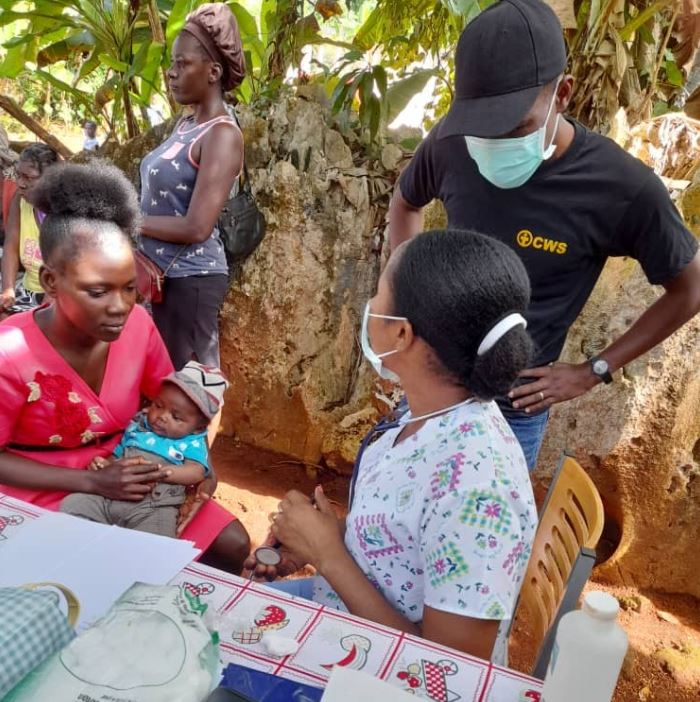Stories of Change

Medical staff talk to patients on the first day of the 12-day mobile clinic in Pestel.
Bringing Healthcare to Remote Communities as Part of Earthquake Response in Haiti
Everyone should be able to access medical care if they need it. Unfortunately, there are a lot of hurdles between many of our neighbors and the care that they need.
On the morning of Saturday, August 14, 2021, a 7.2-magnitude earthquake shook Haiti. Its epicenter was in the southwest, not far from the municipality of Pestel. More than 2,200 people died. Thousands were injured. Fields that had been ready for harvest were destroyed. Buildings collapsed.
There is only one health center that serves Pestel’s 97,000 residents. It was damaged in the quake, and the medical team hasn’t been able to treat patients inside of it since. The health center staff has been seeing patients in the yard, but even then, many traumatized people are scared to make the journey to the hospital. Older adults, pregnant women and people with disabilities often had challenges getting to the hospital before the earthquake, and now it’s even harder.
Our team on the ground in Pestel knew that treating injuries, monitoring mental health and offering other medical services had to be a priority after the earthquake. We met with departmental authorities, local authorities, managers of the health center of Pestel and people across Pestel in order to conduct a Rapid Needs Assessment. Together, we decided that a mobile health clinic could bring desperately-needed care to locations around Pestel. If people can’t or won’t go to the hospital, we can bring the hospital services to them.
On November 29, the mobile health clinics began. It was the first day of a 12-day tour to 12 locations across Pestel. The team of professionals in each location included two doctors, four nurses (including a midwife specialist), two social workers, an organizer and a driver. The mobile clinics are focusing on caring for often-overlooked groups who have trouble accessing medical care: pregnant women, older adults, children and people with disabilities. The team is also prepared to offer initial mental health support to patients in need. The 12 clinic locations were chosen for two reasons: 1) they are central so that people in even more remote areas can reach them and 2) they are not covered by other healthcare options.
In planning the clinics, our goal was to see about 140 patients in each location. For comparison, the hospital was treating about 30 patients a day before the earthquake. What we quickly realized, though, is that the mobile clinics were more popular than anticipated. On the first day, we saw 205 people. On the second and third days we saw 132 and then 317 people. That was an average of about one and a half times as many people as we expected. The hospital sent additional staff starting on the third day to meet the increased demand. The first three days of mobile clinics show how much the community needs medical care and that the mobile clinics are a great way for people living in remote areas to get medical care.
The mobile clinics are one part of the partnership between CWS and the Pestel health center as we collaborate to support the people of Pestel on the road to health and recovery. Learn more about the CWS earthquake response here or donate here.
——–
We are grateful for the support of the CWS family and our valued partners in the August earthquake response. We would like to thank Episcopal Relief and Development, the Evangelical Lutheran Church in America, the Church of the Brethren, the United Church of Christ, Week of Compassion and the Christian Reformed Churches in the Netherlands. Our ACT Alliance partners, alongside generous congregational, individual and foundation supporters, are also making this response possible.
